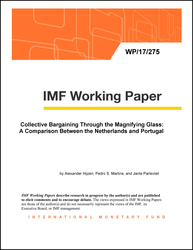
Collective Bargaining Through the Magnifying Glass
A Comparison Between the Netherlands and Portugal
Since the global financial crisis, sector-level bargaining has come under renewed scrutiny.
While in Southern Europe, the crisis raised concerns about the role of collective
bargaining as an obstacle to labor market adjustment, in Northern Europe it was perceived
more favourably and, according to some, may even have helped to weather the fallout of
the crisis more easily. This paper seeks to contribute to a deeper understanding of
sector-level bargaining systems and their role for labor market performance. We compare
two countries with seemingly similar collective bargaining systems, the Netherlands and
Portugal, and document a number of features that may affect labor market outcomes,
including: i) the scope for flexibility at the firm or worker level within sector-level
agreements; ii) the emphasis on representativeness as a criterion for extensions; iii) the
effectiveness of coordination across bargaining units; and iv) pro-active government
policies to enhance trust and cooperation between the social partners.
Publication date: December 2017
ISBN: 9781484332986
$18.00
Add to Cart by clicking price of the language and format you'd like to purchase
Available Languages and Formats
| English |
Prices in red indicate formats that are not yet available but are forthcoming.
Topics covered in this book
This title contains information about the following subjects.
Click on a subject if you would like to see other titles with the same subjects.
Industrial relations , social dialogue , General , Comparative Studies of Particular Economies
Summary
Copyright © 2010 - 2024
Powered by:
AIDC



